Among the many, many, MANY fake THC vape cart brands we have covered on this website, a decent amount of them have infringed on trademark before. The trademarks violated by fake cartridge brands extend to candy, cereal, cartoons, comic books, and numerous other products. Yet we see daily queries asking if they are legit.
Once again: CEREAL CARTS ARE FAKE
Cases like this frustrate us to no end. Every time we see somebody post a sample like this:
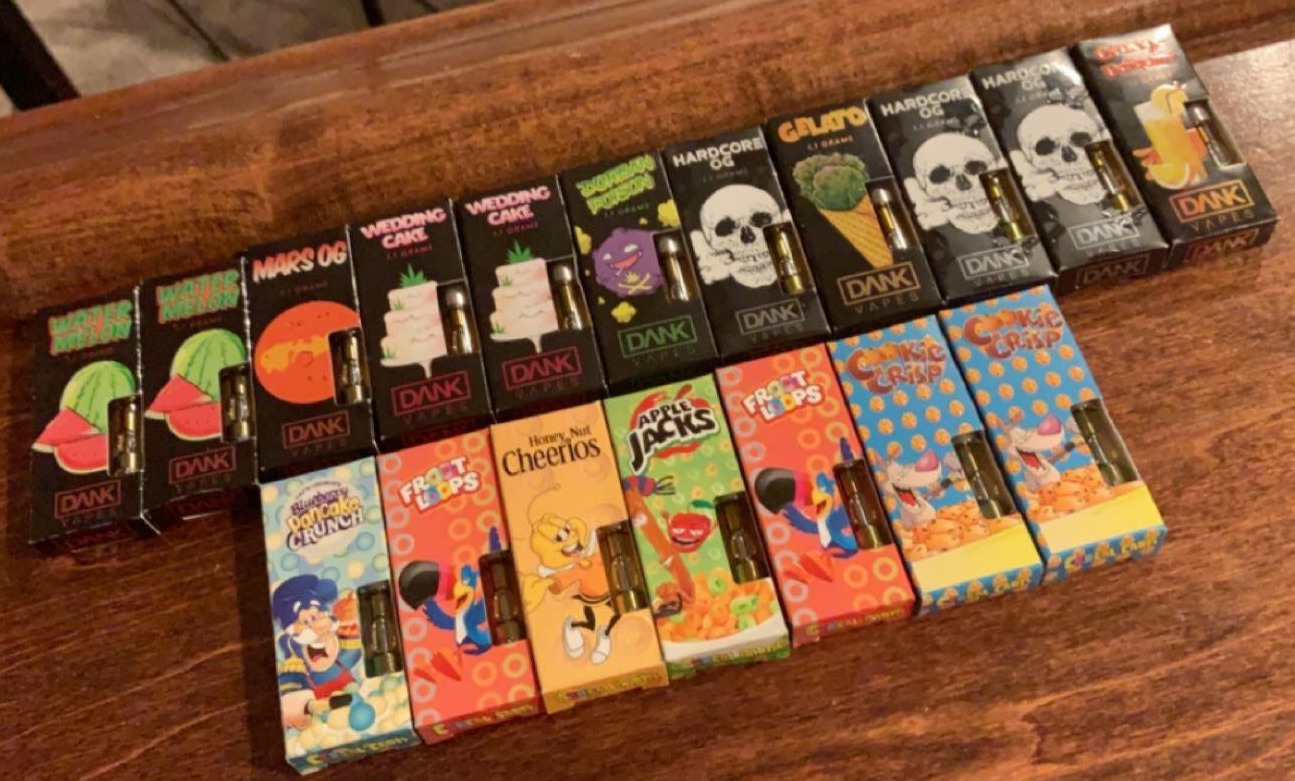
And they say “But I thought these were legit!”
Please. Please let it stop.
I can excuse the Danks, because even though the packaging is sketchy and obviously a Photoshop job, at least the package isn’t aimed at replicating any particular brand. But Cereal Carts? Seriously? Froot Loops? The Kellogg’s brand cereal, complete with the mascot (“Toucan Sam,” to you), first established in 1963? Look:
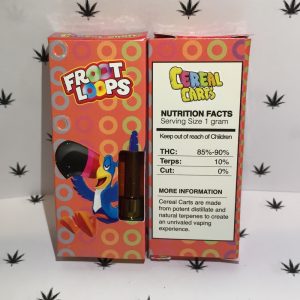
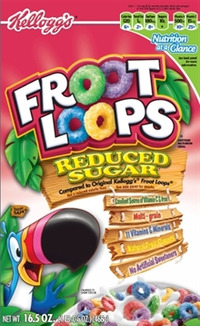
The logo is lifted directly from the box!
How can anyone think this happens?
How does it work where a cannabis extract vape cartridge company calls up Battle Creek, Michigan, at this building:

…and says “put me through to legal,” and then says, “hey, we’re going to rip the brand, logo, and mascot right off your children’s cereal packaging and use it for our pot vapes, just for kicks.”
And then the lawyer for Kellogg’s says, “Yeah sure, it will be fun to have you profit illicitly off our internationally recognized brand name while selling a product not remotely intended for children and even forbidden strictly by THC vape cart packaging laws.”
In what universe does that conversation make any sense?
I don’t know which one shocks me more: The fact that people can think a Froot Loops cart is a real, licensed product, or the fact that The Kellogg Company can’t be bothered to post a message somewhere, anywhere, at least with the disclaimer: “No, dummy, these aren’t licensed carts.”
Is nobody else going to back our play on this? The Kellogg Company holds a royal warrant of appointment signed by Queen Elizabeth II and the Prince of Wales. Their assets total $17 billion. Their employees number to 34K. And it’s up to just us to defend their trademark? I’m sure glad we don’t have to single-handedly repel a Martian invasion or anything, because we’re just a little bit busy right now defending the honor of a cartoon toucan who sells cereal.
Trademark infringement lawsuits do still happen, do they not? We checked, and yes, they do…
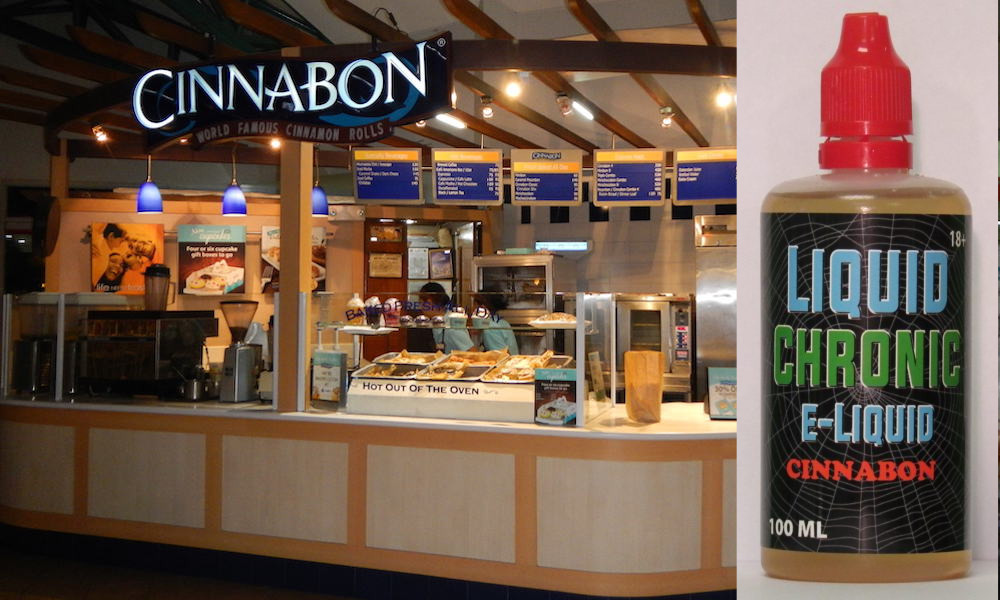
Cinnabon sued a vaping company for trademark infringement
Just last October, Cinnabon sued a Las Vegas e-cigarette vape cart maker for labeling their product with the Cinnabon brand name. Cinnabon, a baked goods company famous for cinnamon roll products sold at kiosks in malls and airports, takes exception to being affiliated with vape cartridges. Cinnabon reports sending the company “three separate letters sent between February and June that did not receive a response.”
Despite the federal lawsuit filing, Liquid Chronic Eliquid still has the product page up right now. All the company has to do is change the flavor name to something that doesn’t infringe the trademark, like “cinnamon roll” or something else generic, and they’d be in the clear.

The EDM band Deadmau5 sued a vape supply for copyright infringement
Deadmau5, a band with which our readers are likely familiar, sued West Coast Vape Supply for having a logo too close to their band logo. Yes, we know Deadmau5 is actually one person, but technically speaking it’s a “they” since the suit was filed through his owned corporate entity Ronica Holding Limited, which presumably has at least one staff.
In this case, after Ronica sent Alham Benyameen of West Coast Vape Supply a cease and desist letter, the company complied and removed the similar logo. Deadmau5 is going on with the lawsuit anyway for past damages. We’re not normally ones to cheer for spiteful litigation, but in this case we’re happy to see a vape seller get thoroughly spanked for once, even if it’s a nicotine vape juice outfit.
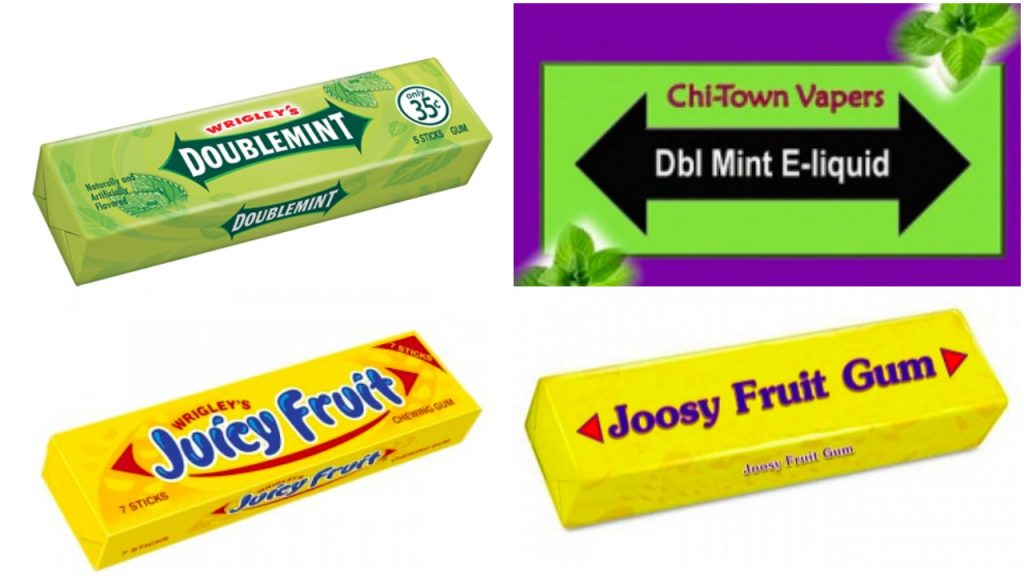
Wrigley’s gum sued a vape brand manufacturer for similar brand names
Chalk up another tobacco vape juice company that has been slapped with a trademark infringement lawsuit. This time it was Wrigley Company vs. Chi-Town Vapers, which put out two brands of vape juice “Dbl Mint” and “Joosey Fruit” which imitate flavors of Wrigley chewing gum products.
The spokesman for Wrigley, a Mars, Incorporated subsidiary, really makes an impression with his statement to the media: “The use of popular candy brands in the marketing, sales and promotion of e-cigarettes is… grossly deceptive and irresponsible. We strongly condemn these actions, which are directly at odds with our anti-tobacco policy and our strict marketing standards.”
Yeah, you tell ’em, Wrigley!
Can we get some more justice for infringed brands around here?
We’ll be happy to pass along the story about any commercial companies that would like to take this opportunity to defend their trademark, copyright, or business or intellectual property against these unregistered cartridge brands. Any time one of these companies cares to say something is fine by me. Apparently, there are enough people out there being misled that there is a possible claim for damages in every case.
Krazy Glue vs. “kr8zy glue“ – Definitely one of the weirdest instances. Who looks at an industrial adhesive bond and says “I’ve got to inhale this”?
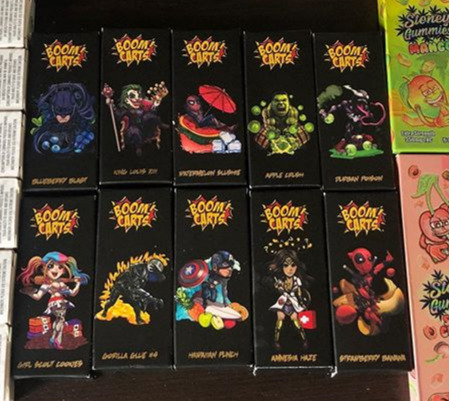
Marvel & D.C. Comics vs. “Boom Carts“ – Even though the name has nothing in common, Boom Carts packaging insists on including copyrighted cartoon characters. Not only is this completely pointless for selling THC vape oil, but the intent is also clearly to market to children. There’s Batman, Superman, Spider-Man, Wolverine, Captain America, the Incredible Hulk, Venom, Joker, Harley Quinn, and Deadpool, just to name a few.
Seriously, a universally beloved character like Batman, and you want a little kid to vape some vitamin E acetate with his face on it?
Baskins Robbins vs. “31 Flavors“ – With this brand, it’s a tossup which company has the most claim to sue, because it violates multiple trademarks at once. Nabisco has some claims against the Oreo brand rip-off there. But the name of the whole brand, “31 flavors,” is the recognized slogan of Baskin Robbins ice cream company.
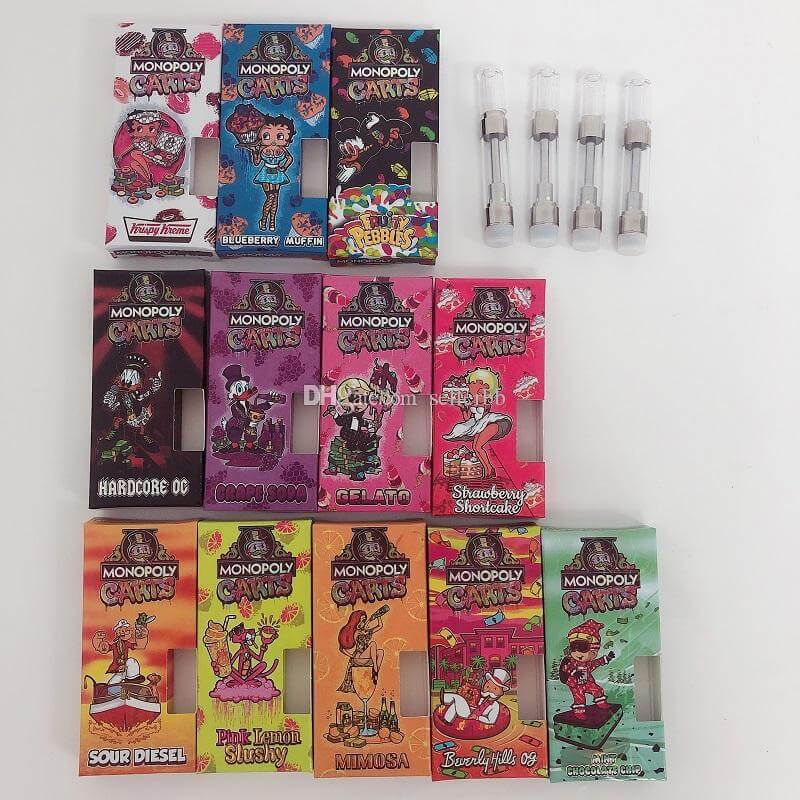
Hasbro vs. “Monopoly Carts“ – Here again, the actual cart packaging freely raids pop culture cartoon characters including Donald Duck, Richie Rich, Jessica Rabbit, the Pink Panther, Popeye, and many others. But we’ll settle for Hasbro, Inc., since they acquired Parker Brothers in 1991 and hence own the trademark to the classic family board game.
Disney vs. “Star Carts“ – Oh, I’m sorry, does one of the world’s biggest entertainment conglomerates not have the resources to go after infringement of one of the most popular film franchises of all time? Darth Vader’s ol’ shell head helmet is on every single package.
We could go on, but these are a starting point.
We have to do something about this
All kidding aside, these infringed brands and companies should sue, if for no other reason than to speak out for the public’s health. The vape lung injury crisis is still ongoing, with new users falling ill even into last month.
Even if the original black market package printer is out of reach of American litigation, the packaging is still being advertised and sold on American websites such as DHGate and Alibaba. The Chinese eCommerce company Alibaba Group owns DHGate, Wish.com, and several other retail kiosks, and has been sued for selling counterfeit bike products which violate safety standards. Alibaba has also been sued to the tune of $250 million for securities fraud, and has also been the subject of lawsuit by Yves Saint Laurent for selling black market counterfeits of their products.
Alibaba Group seems to spend so much time in court, you’d think they have their own reserved parking there.
Something more has to be done
Nevertheless, it’s not enough litigation. We’re sick and tired of seeing impressionable young users ask us if they can trust a brand invoking Spider-Man or Oreo cookies. The least these companies could do is move to protect their own financial self-interest and brand image, at the same time scoring an advancement of public awareness in a matter of public health.
It would be nice to see corporate law do some good work sometimes.


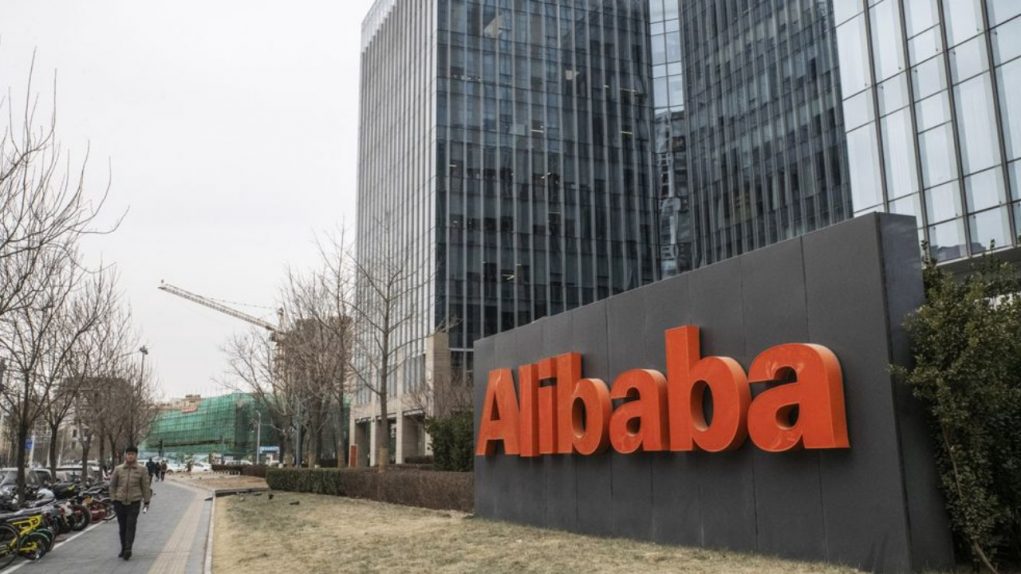


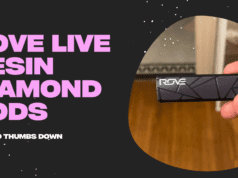
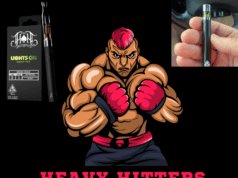



You could definitely see your enthusiasm
in the article you write. The arena hopes for more passionate writers such as you who are not afraid to mention how they believe.
Always go after your heart.
I’m not sure why but this site is loading incredibly slow for me.
Is anyone else having this issue or is it a problem on my
end? I’ll check back later and see if the problem still
exists.
What i do not understood is if truth be told how you’re not really a
lot more neatly-liked than you might be now. You are so intelligent.
You already know therefore considerably in terms of this topic, produced me individually consider it from
numerous various angles. Its like women and men are not interested unless it is one thing to do with Lady
gaga! Your personal stuffs great. Always handle it up!
Link exchange is nothing else but it is only placing the other person’s web site link on your page at
proper place and other person will also do similar for you.
I know this web site gives quality depending posts and other
material, is there any other site which provides
these kinds of things in quality?
Good blog you’ve got here.. It’s difficult to find
high quality writing like yours nowadays. I seriously appreciate
people like you! Take care!!
It is the best time to make some plans for the future and it’s time to
be happy. I’ve read this post and if I could I wish to suggest you some interesting things or advice.
Perhaps you could write next articles referring to this article.
I desire to read even more things about it!
My brother suggested I would possibly like this web site. He used to be totally right.
This publish truly made my day. You can not consider
simply how a lot time I had spent for this info! Thanks!
I delight in, lead to I discovered exactly what
I was looking for. You have ended my four day lengthy hunt!
God Bless you man. Have a great day. Bye
You could certainly see your enthusiasm in the article you write.
The arena hopes for more passionate writers such
as you who aren’t afraid to say how they believe. At all times go after your heart.
Greetings from Carolina! I’m bored to tears
at work so I decided to check out your blog on my iphone during
lunch break. I enjoy the information you present here and can’t
wait to take a look when I get home. I’m shocked at how quick your blog loaded on my mobile ..
I’m not even using WIFI, just 3G .. Anyhow,
amazing blog!
Hi everyone, it’s my first pay a quick visit at this website, and piece of writing
is really fruitful for me, keep up posting these types
of content.
Your method of telling the whole thing in this piece of writing is genuinely good, every one be able to without difficulty be
aware of it, Thanks a lot.
Appreciate the recommendation. Let me try it out.
you are in reality a excellent webmaster. The web site loading pace is amazing.
It kind of feels that you’re doing any unique trick.
Furthermore, The contents are masterpiece. you have done a excellent task in this topic!
Howdy! This is kind of off topic but I need some help from an established blog.
Is it very hard to set up your own blog? I’m not very
techincal but I can figure things out pretty
fast. I’m thinking about creating my own but I’m not sure where
to start. Do you have any points or suggestions? Thanks
I loved as much as you’ll receive carried out right here.
The sketch is tasteful, your authored material stylish.
nonetheless, you command get got an impatience over that you
wish be delivering the following. unwell unquestionably come further formerly again since
exactly the same nearly very often inside case you shield
this increase.
Hey there! Quick question that’s totally off topic. Do you know how to make your site mobile friendly?
My weblog looks weird when browsing from my iphone 4. I’m trying
to find a template or plugin that might be able to correct this issue.
If you have any suggestions, please share. Appreciate it!